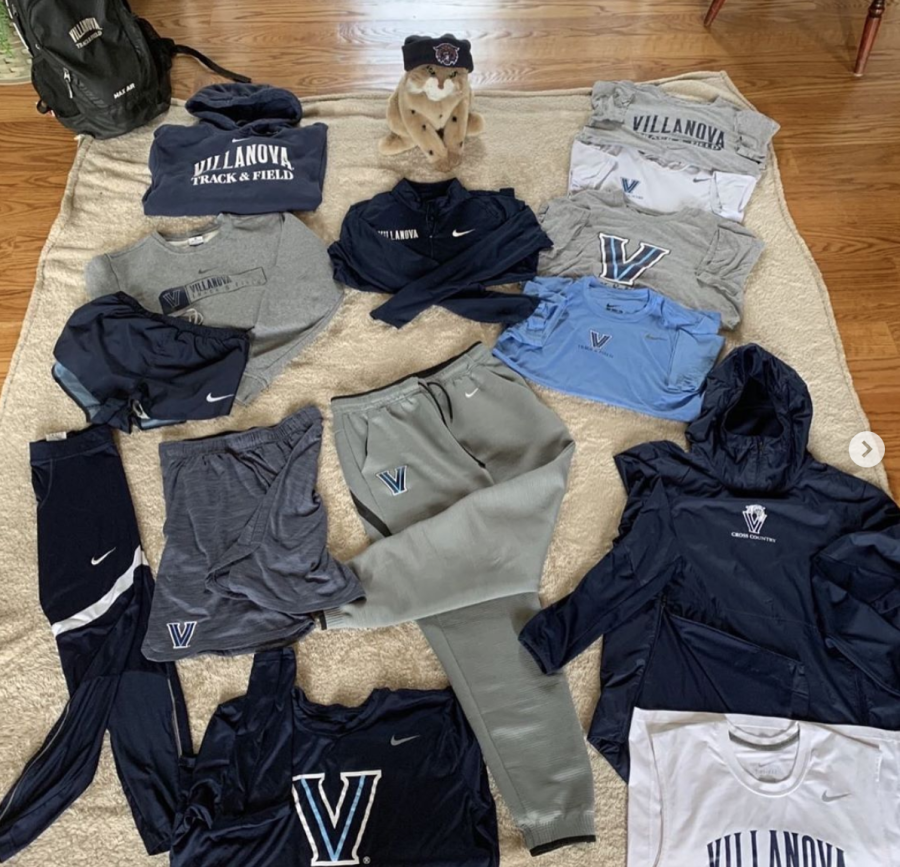Track and Field “Super-Super Senior” Organizes Raffle to Support 52nd Street Project in West Philadelphia
Courtesy of @villanovaxctf Instagram
Track and Field “Super-Super Senior” Organizes Raffle to Support 52nd Street Project in West Philadelphia
September 2, 2020
Villanova men’s track and field runner, Casey Comber, had himself a busy summer. The stud 3:57 miler and former NCAA indoor nationals runner-up put in serious training as he enters his sixth year of competition as a self-proclaimed “super-super senior.” He also helped in organizing a raffle to help contribute to the Enterprise Center’s “Support 52nd Street” project.
Comber and his teammates held a gear raffle through the @villanovaxctf Instagram page and other social media pages. All proceeds went to the 52nd Street corridor in West Philadelphia, an underdeveloped and predominantly Black neighborhood, hit hard by the effects of COVID-19, looting and property damage that occurred this summer.
The Villanovan had the opportunity to catch up with Comber and about his charity efforts, his feelings about the upcoming track season and everything in between.
The Villanovan: What is the “Support 52nd Street” project and what made you decide to get involved with it?
Comber: The Enterprise Center is an organization in Philadelphia that helps minority entrepreneurs, a lot of which don’t have access to capital that they need to either grow their businesses or at least keep the doors open. Particularly, in the wake of the pandemic, as well as the looting and rioting that happened in certain areas of the city, there were a lot of struggling businesses. Basically, the Enterprise Center had a specific effort to help a corridor along 52nd Street in West Philly. They were providing $2,000 grants to a number of small businesses there. I thought it was a very specific and good use of resources that we could contribute to. While people have been striving to better educate themselves on the struggles present within the Black community, it has been really nice to do something concrete like raising money and helping people in a specific way. I’m happy that my teammates and I were able to get involved in this project.
TV: What feedback have you received from the people that you helped? What is the most rewarding part of the charity process?
CC: We got a lot of gratitude from the organization itself. As far as the grants actually going to the businesses, that is between the Enterprise Center and those businesses. So we haven’t received feedback from them yet. I have, however, received feedback from people who sent in donations. You know, emails just complimenting everyone involved and saying how it was such a cool way to become part of a social justice movement. Villanova is kind of its own bubble out in the burbs of the Main Line. Sometimes you don’t know what’s happening right under your nose, and you go eight miles down Lancaster Avenue, and there are people really struggling. We ended up raising just over $5,000 for the project and it was a good feeling.
TV: You have one season left of outdoor track eligibility. What made you decide to compete for another season, and what are your goals for the upcoming track season?
CC: To be honest, the goal was always to make the Olympic Trials. After a rough year last year with the season being cancelled, it could end up being a blessing in disguise for me. The state of the world right now is not a blessing, but athletically speaking, I didn’t feel that I was in my best shape last year, especially compared to the year prior. Now with the Trials getting pushed back a full year and getting the opportunity to come back to Villanova and compete in the Spring, it is a chance to keep my running career going. If it goes well, it may allow me to keep it going even after this year. It is a unique opportunity to be coming back just for one season as a “super-super” senior, but I was definitely happy to get the opportunity.
TV: You dealt with a lot of challenges this year. Following an excellent redshirt junior year campaign, you had a lingering sickness for the fall cross country season, and your spring track season was ultimately disrupted by COVID-19. How have you been able to overcome these obstacles?
CC: I definitely had some hard moments last year. Sometimes when one phase of your life isn’t going right, it crosses over to other phases and I was getting really stressed out. Just kind of desperately trying to crawl my way back into fitness. Sometimes when things pile on to one another, it is best to take a long break. After last year, a few months ago, I ended up taking almost a month off just to refresh myself mentally and prepare for one more long grind physically. I think the idea of just taking some time to not work as hard and decompress, although that may seem counterintuitive at times, is very beneficial. Because when you overwork yourself, you start to see some negative effects and I think that I really needed to stop everything for a little while so that I could get myself back on track and reset.


